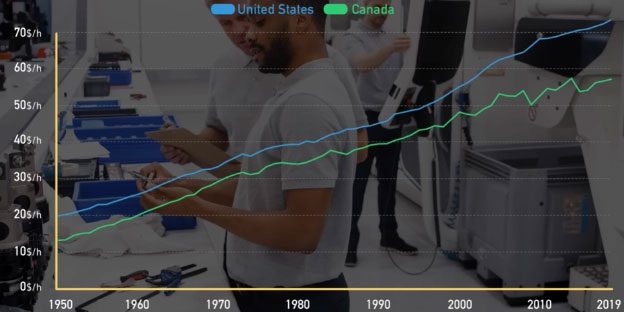We don’t spend several hours each day by the washing machine because it runs on its own, yet we waste countless hours doing nothing productive while browsing the internet.

Washing Machine and the Internet, which has a greater impact?
The internet has changed many aspects of life to the point where no one can remember the last time they went a whole day without engaging with it. During the COVID-19 pandemic, it was thanks to the internet that we could maintain our work from home, meet friends, shop, and entertain ourselves.
Which has changed the global economy and human life more: the washing machine or the internet? Everyone believes that the internet is the greatest invention. However, South Korean economist Ha-Joon Chang argues that it is the washing machine that deserves this title. According to him, we have underestimated the importance of household automation devices while overvaluing the role of the internet.
Determining which is more important for the economy could be the key to unlocking development opportunities for poorer countries. For instance, should we bring the internet or washing machines to them for economic development?

The washing machine was invented in the 1850s.
The washing machine was invented in the 1850s. However, at that time, this machine consumed a lot of energy, while most households lacked electricity. Wealthy families who could afford this “magical machine” often didn’t need it because they had servants to handle laundry.
Things began to change in the 1930s. Even during the Great Depression, almost every household had electricity. In World War II, automated household machines became extremely important as women were needed in the workforce and entered production lines while men went to war. Washing clothes by hand for a family could take an entire day. This was manageable when women stayed home as homemakers, but when they had to work outside, spending hours on a single task among many others became a significant burden. Washing machines, vacuum cleaners, irons, and other devices that we see as “ordinary” today have saved a lot of time for women. As a result, many were able to join the workforce more permanently and stably. Even after World War II, many rushed to buy household appliances that aided their lives with the money they earned and saved.

Washing machines save a lot of time for women.
In economics, we have become familiar with the concept of labor productivity, one of the most important yet often overlooked measures of an economy. Labor productivity is calculated by dividing the value of goods and services produced by the number of hours worked. For example, the average labor productivity in the U.S. is $73/hour. Increasing productivity is crucial because it allows workers to be paid higher wages without causing inflation, thereby improving living standards and enriching the economy. To enhance productivity, we can train workers to higher skill levels and provide more useful tools. Below is a chart showing the productivity differences between the U.S. and Canada.

Comparison of labor productivity between the U.S. and Canada. (Source: Economics Explained).
Despite having similar skills, workers in the U.S. have a productivity advantage of $20/hour because companies here invest heavily in tools and equipment to accomplish more tasks in the same amount of time.
Overall, labor productivity tends to rise when the economy is declining. In the U.S., productivity increased significantly after the 2008 financial crisis.

Productivity of non-agricultural sectors in the U.S. (Source: Economics Explained)
The reason is that companies often lay off the weakest workers first. Those who remain are capable and have more opportunities to use machinery and tools. They also work harder because they fear losing their jobs.
Women officially entered the workforce noticeably starting in the 1960s, increasing both labor participation rates and productivity. Is this contradictory? One would expect that a significant influx of inexperienced workers would lower average productivity. In reality, this new workforce took over simple tasks, thereby allowing older workers to tackle more complex jobs and enhance their skills. This is similar to a lawyer hiring an assistant to handle peripheral tasks like billing and bookkeeping to focus entirely on their expertise.
Furthermore, by entering the workforce, women also opened up a new consumer market, as this was the first time they had their own money to purchase what they liked. Liberating half of the population from unpaid full-time domestic work and integrating them into the workforce, enabling them to become independent consumers, has been one of the most powerful economic drivers over the past century. All thanks to household appliances like washing machines.

Service robots.
This also shows that we need not fear the “invasion” of machines or artificial intelligence. They will take over many jobs but will also give us more time to engage in activities that provide greater value. Instead of doing calculations by hand, we have calculators and Excel to perform complex tasks like financial reporting, forecasting, or reading and analyzing data. We don’t lose jobs because of “Excel”; on the contrary, new jobs are created, and we only lose jobs to “those who know how to use Excel.” The same will be true for future artificial intelligence.

The Internet is an essential tool for businesses.
The internet is an essential tool for businesses, but its impact is not as great as we think. The internet enables remote communication, but before that, we had fax machines, telephones, and telegraphs. Companies could send information to each other relatively quickly. The internet indeed allows us to transmit non-text information like video and audio more easily. However, most companies do not frequently use these file formats.
Economist Ha-Joon Chang points out that the telegraph reduced communication time between America and Europe from three weeks to 30 minutes, which is 2000 times faster. Sending four pages of information via fax takes about 30 seconds, while email takes three seconds. Thus, email is only ten times faster than fax, and this change is not as significant.
Many companies leverage the internet to achieve significant profits. For example, commodity traders use continuous information flow to speculate on futures contracts. While it is profitable, it contributes very little to the economy as a whole. Social media companies also provide us with entertainment services via the internet. You can decide for yourself how much value they bring to society. However, according to Ha-Joon Chang, these things tend to distract more than enhance productivity.

Ha-Joon Chang argues that this utility does not contribute much to the economy compared to household appliances.
Ha-Joon Chang’s perspective is not to deny the importance of the internet, but to emphasize that this utility does not contribute to the economy as much as household appliances that can double the workforce. We don’t spend several hours each day by the washing machine because it runs on its own, but we waste countless hours doing nothing productive while browsing the internet.


















































